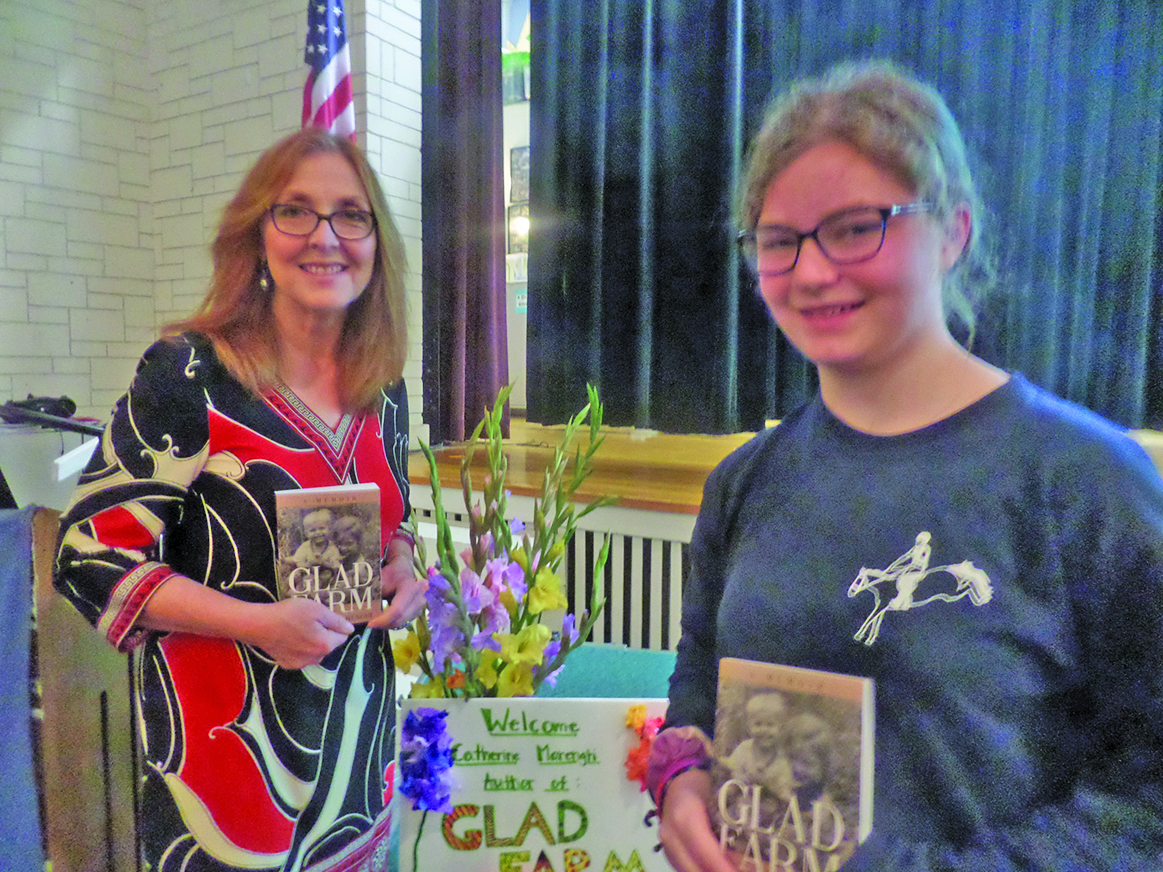Memoirist Catherine Marenghi recently visited Hopedale Jr. Sr. High School to talk to interested students there about writing, her life growing up in the Milford area, her connections to Hopedale, and her book, Glad Farm. You might think at first that the title of her book indicated an idyllic farm life in this area’s more rural past. In fact, Marenghi’s parents ran a gladiolus flower farm on Prairie Street in Milford. The flowers, quite popular in the 1940’s, were often referred to as “glads.”
The story Marenghi shared was bleak at times—living in extreme poverty, surrounded by families that were better off. And yet, the story is also that of a girl who was smart, studied, was the valedictorian of her class, was accepted to Harvard but chose to go to Tufts University, with the aim of being a writer. Throughout Marenghi’s presentation, she focused on those in her life who were the encouragers, especially those teachers who offered her guidance and believed in her. “Education was my escape,” she shared with the students. “Education makes you wealthy,” she continued. “My dream was to go to college, work and get my parents a home.” Marenghi graduated from Tufts and discovered that her goal of creative writing was not in the cards for her right then. Instead, she found work in trade publishing and later in the public relations field, eventually running her own company of twenty-four employees. “I ended up writing a lot of press releases,” she said. “In press releases, you have to be concise – good training for any writer. And writers are in demand in the business world. If you can write well, you’ll find work.”
Marenghi’s skills as a writer shone through as she read a few short portions of her memoir to the students. She pointed out that houses in her story took on the role of real characters, and the detailed writing she shared with the group brought her tattered home to life.
Marenghi has close ties to Hopedale that she shared with the students. Both her parents worked at the Draper Corporation, and it was there that her parents met. “If if hadn’t been for the Draper Corporation, I wouldn’t be here,” she noted. She explained that people used to take pallets from the Draper Corporation and used the wooden pallets to make houses. “Our house was never intended as a permanent dwelling, but that’s what it became for our family,” she explained. “My father was neither a plumber, a carpenter nor an electrician, but he was poor. He worked full time as a jitney driver for the Draper Corporation, and then came home and worked nights and weekends on the farm. My father was a broken man when I remember him.” She described her mother as “beautiful, but she grew worn with taking care of five children and the farm. She had the gift of making things grow. We ate well in the summer.”
The Hopedale students were encouraged to write by this experienced and gifted writer. She asked the students, “Do you imagine you’d like to be a writer? Writers often don’t make a lot of money, but if you can tell a good story, you can do anything.” Marenghi described attending a writer’s retreat and sharing stories of her life. “People thought I was joking,” she said. “But one person said, ‘You should write a memoir.’ I’d never thought of that.”
Marenghi showed a photo of a hope chest, and described going through her mother’s hope chest, a cedar chest her mother had used to save all the things dear to her heart. As Marenghi went through the chest she learned of the glad farm—it had never been talked about when she was a child. She realized that being an entrepreneur was something she shared in common with her mother.
At the end of her presentation, the writer took questions from the students. Debbie Goss, reading specialist at Hopedale Jr.-Sr. High, explained that the students who attended had been invited to come to the presentation. “We sent out a survey to all the students, asking them of their interest in writing,” Goss explained. “We only invited those who were really interested. We wanted to be sure she had a receptive audience.”
One student noted his parents wouldn’t answer his questions about growing up in another country. Marenghi encouraged the student. She said, “My mother never answered my questions directly. I had to learn about a lot of what I know now from what I found in her hope chest.” She then urged the student, “You have to keep asking.”

Issue Date:
June, 2017
Article Body:
